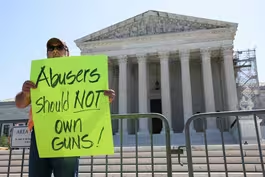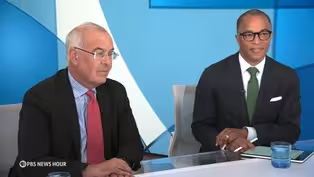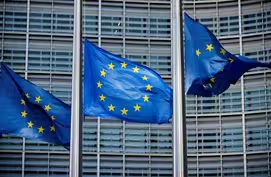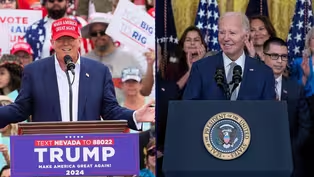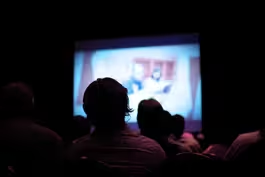
India's Muslims face discrimination after Modi's win
Clip: 6/21/2024 | 8m 47sVideo has Closed Captions
India's Muslims continue to face discrimination and hate following Modi's election win
Indian Prime Minister Narendra Modi secured a third term, but his party lost its majority in parliament. Modi portrays himself as a strong leader of a rising nation, but his ten years in office have been marked by a fierce crackdown on dissent and India's ethnic and religious minorities. Zeba Warsi reports with support from the Unity Productions Foundation.
Problems playing video? | Closed Captioning Feedback
Problems playing video? | Closed Captioning Feedback
Major corporate funding for the PBS News Hour is provided by BDO, BNSF, Consumer Cellular, American Cruise Lines, and Raymond James. Funding for the PBS NewsHour Weekend is provided by...

India's Muslims face discrimination after Modi's win
Clip: 6/21/2024 | 8m 47sVideo has Closed Captions
Indian Prime Minister Narendra Modi secured a third term, but his party lost its majority in parliament. Modi portrays himself as a strong leader of a rising nation, but his ten years in office have been marked by a fierce crackdown on dissent and India's ethnic and religious minorities. Zeba Warsi reports with support from the Unity Productions Foundation.
Problems playing video? | Closed Captioning Feedback
How to Watch PBS News Hour
PBS News Hour is available to stream on pbs.org and the free PBS App, available on iPhone, Apple TV, Android TV, Android smartphones, Amazon Fire TV, Amazon Fire Tablet, Roku, Samsung Smart TV, and Vizio.
Providing Support for PBS.org
Learn Moreabout PBS online sponsorshipWILLIAM BRANGHAM: This month, Indian Prime Minister Narendra Modi secured a third term, but his party lost its majority in Parliament.
Modi portrays himself as the strong leader of a rising India, but his 10 years in office have been marked by a fierce crackdown on dissent on millions of Indian citizens who belong to ethnic and religious minorities.
Producer Zeba Warsi traveled across Northern India to report on the impact on India's Muslims.
ZEBA WARSI: Nestled in Northern India, Ghatmika is a Muslim-majority village where the roads are dusty, crumbling walls are patched with sun-baked bricks, and the memories are searing.
Last year, this forgotten hamlet suffered the unforgettable.
SAJIDA, Wife of Junaid (through translator): I couldn't believe it, but I had to come to my senses.
I had no choice.
We never thought something like this could happen to us.
We spoke to Sajida about her husband, Junaid, and his friend, Nasir, killed by Hindu extremists last year, their car torched, their bodies burnt.
Junaid and Sajida raised six children.
That's their eldest, 13-year-old Parvana with their youngest, 4-year-old Varfaan (ph).
Parvana seemed sick, depressed, and wouldn't speak much.
Her mother told us she's been like this since her father's murder.
SAJIDA (through translator): She has never recovered since her father was killed.
We are trying to get her treatment.
She had an attack after her father's death.
ZEBA WARSI: She truly never recovered.
Just weeks after we met her, Parvana died.
It's not clear how.
The family blames heartbreak.
The whole family is heartbroken.
Junaid's cousin Ismail visits this grave site often.
The two men were so brutally beaten and burned, their remains were beyond recognition.
So each gravestone bears both names.
ISMAIL, Cousin of Junaid (through translator): To this day, people fear.
The way in which Junaid and Nasir were abducted in broad daylight, people are still scared.
ZEBA WARSI: And people don't trust the police, who turned Junaid and Nasir away after they had been abducted, but before a mob burned them alive.
ISMAIL (through translator): How could the police just send them away when they saw these men around the verge of dying?
Had the police done its job and helped them, and had they arrested those who beat them up, instead of letting them take them away, Junaid and Nasir would have been alive today.
ZEBA WARSI: Why do you think your husband was targeted?
SAJIDA (through translator): Because he was Muslim.
He had no enemies, nothing.
Only because he was a Muslim.
ZEBA WARSI: Junaid and Nasir's alleged killers belong to Bajrang Dal, a far right Hindu extremist group which the U.S. once labeled a militant religious organization.
They attack Muslim men for allegedly smuggling and killing cows, considered sacred by many Hindus.
During Prime Minister Narendra Modi's tenure, India has seen rising anti-Muslim violence by self-styled vigilantes.
Videos like these of Muslim, Christian and other religious minorities being beaten are all too common.
Human Rights Watch reported, in recent years, dozens of Muslim men have been killed and hundreds injured in hate crimes.
The prime suspect in Junaid and Nasir's case is this man, Monu Manesar, a local Hindu right leader often seen with assault rifles.
He used to upload videos of his own crimes against Muslims on social media.
He has also been seen in the company of top government ministers, including Modi's right-hand man, India's home minister, Amit Shah.
Months after Junaid and Nasir's murder, he called for a provocative Hindu right rally in the same state where they were killed.
The rally turned violent, as Hindus and Muslims fought.
At least six people were killed, a mosque was burnt, and its young imam stabbed over a dozen times.
The "News Hour"'s questions for local government officials and requests for an interview went unanswered.
In the days after, the state government led by Modi's party launched a crackdown not against the suspects, but against their victims.
This used to be a bustling cluster of Muslim-owned shops, businesses and homes that have now been reduced to rubble by Indian authorities.
The government says it was targeting illegal construction.
But activists and civil society experts say that this is part of a larger trend and that India's Hindu right government has weaponized demolishment of Muslim properties as a mode of collective punishment and to instill fear in the community.
MILAN VAISHNAV, South Asia Program Director, Carnegie Endowment for International Peace: There are many things which are legally built in India, but the idea that it is just these particular habitations as being targeted is, I think, symptomatic of the broader issue of essentially minorities being targeted because of their beliefs.
ZEBA WARSI: Milan Vaishnav is the director of the South Asia Program at the Carnegie Endowment for International Peace.
He said Modi's government has condoned violence against India's religious minorities.
MILAN VAISHNAV: The state is sort of giving or granting a broad permission structure, under which these groups are allowed to act with impunity.
ZEBA WARSI: Last year, at the White House, next to President Biden, when he was asked about anti-Muslim discrimination, Modi issued a strong denial.
NARENDRA MODI, Indian Prime Minister (through translator): Democracy is in our DNA.
We have always proved that democracy can deliver.
And when I said deliver, this is regardless of caste, creed, religion, gender.
There's absolutely no space for discrimination.
ZEBA WARSI: But Modi's election campaign was filled with anti-Muslim hate speech.
He referred to India's 200 million Muslims as infiltrators.
And within weeks of Modi's reelection, three Muslim men have been killed, allegedly in a hate crime.
And over a dozen Muslim homes have been demolished in states ruled by his party.
MILAN VAISHNAV: These are not something that one election at the national level will do away with.
I think it's fair to say that we can expect more of this to continue in the months and years to come.
ZEBA WARSI: In January, he launched his campaign by fulfilling the promise of a grand temple at the same site where, three decades ago, a 16th century mosque was demolished.
Days after, in the wee hours of a winter morning in New Delhi, his government flattened a 13th century mosque without notice.
The government says it was an encroachment and an illegal structure on forest land.
For these children, many of them orphans, that historic mosque was home.
It is where they lived, studied and prayed, and they were made to watch it fall.
Today, they are sheltering at another smaller mosque.
Rahil Khan is 10 years old.
RAHIL KHAN, 10 Years Old (through translator): I watched "Iron Man."
I want to build robots, so we can send them to protect our country and save the lives of our soldiers.
My dream is for my country.
ZEBA WARSI: But they fear their country is stifling their dreams.
AFZAL, 10 Years Old (through translator): We felt terrible.
We wondered why they're demolishing our mosque in school.
It didn't do any harm to anyone.
They told me: "This is not your school.
This is the government's land now."
ZEBA WARSI: Afzal loves to play sports and is the designated troublemaker in the group.
But on that day, he felt cold and helpless.
AFZAL (through translator): They dragged the mosque's chief and snatched his phone.
No one was allowed to come in or go out of the compound.
We were asked to get out of our room and made to stand out in the cold for hours.
MUZAMMIL SALMANI, Teacher (through translator): I saw students who were lying on floor on a single bed sheet.
And they did not have jackets.
They did not have shoes.
They did not have sweaters.
Seeing me there, they started crying.
ZEBA WARSI: Muzammil Salmani is their teacher.
He accused the government of going out of its way to bring down the mosque in a sudden and secret manner.
Why do you think that mosque was targeted?
MUZAMMIL SALMANI: A 700-year-old mosque cannot be an illegal encroachment.
They are demolishing the Constitution of India.
They are demolishing an idea of India.
ZEBA WARSI: An idea of India where these young Muslims say they truly have equal rights and won't fear their future.
For the PBS "News Hour," I'm Zeba Warsi in New Delhi, India.
Ban on domestic violence abusers owning guns upheld
Video has Closed Captions
Clip: 6/21/2024 | 7m 4s | Ban on domestic violence abusers owning guns upheld by Supreme Court (7m 4s)
British journalist backs out of top Washington Post job
Video has Closed Captions
Clip: 6/21/2024 | 5m 49s | British journalist backs out of taking top Washington Post job amid ethics concerns (5m 49s)
Brooks and Capehart on Biden's immigration order
Video has Closed Captions
Clip: 6/21/2024 | 10m 46s | Brooks and Capehart on Biden's immigration order and Trump's mixed message (10m 46s)
News Wrap: EU sets membership talks for Ukraine, Moldova
Video has Closed Captions
Clip: 6/21/2024 | 6m 10s | News Wrap: European Union sets date for Ukraine, Moldova membership talks (6m 10s)
Presidential campaigns, super PACs receive massive donations
Video has Closed Captions
Clip: 6/21/2024 | 5m 43s | A look at the massive donations to campaigns and super PACs this election season (5m 43s)
The summer movies likely to sizzle at the box office
Video has Closed Captions
Clip: 6/21/2024 | 7m 50s | Critics pick the summer movies likely to sizzle at the box office (7m 50s)
Providing Support for PBS.org
Learn Moreabout PBS online sponsorship
- News and Public Affairs

FRONTLINE is investigative journalism that questions, explains and changes our world.

- News and Public Affairs

Amanpour and Company features conversations with leaders and decision makers.












Support for PBS provided by:
Major corporate funding for the PBS News Hour is provided by BDO, BNSF, Consumer Cellular, American Cruise Lines, and Raymond James. Funding for the PBS NewsHour Weekend is provided by...
